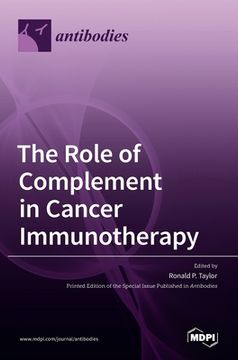Compartir
The Role of Complement in Cancer Immunotherapy (en Inglés)
P. Taylor, Ronald (Autor)
·
Mdpi AG
· Tapa Dura
The Role of Complement in Cancer Immunotherapy (en Inglés) - P. Taylor, Ronald
$ 44.32
$ 55.40
Ahorras: $ 11.08
Elige la lista en la que quieres agregar tu producto o crea una nueva lista
✓ Producto agregado correctamente a la lista de deseos.
Ir a Mis ListasSe enviará desde nuestra bodega entre el
Lunes 10 de Junio y el
Martes 11 de Junio.
Lo recibirás en cualquier lugar de Estados Unidos entre 1 y 3 días hábiles luego del envío.
Reseña del libro "The Role of Complement in Cancer Immunotherapy (en Inglés)"
The dual role of complement in both cancer development and treatment has been investigated extensively and is characterized by a substantial literature that documents the conditions in which complement can either enhance tumor growth or promote the killing of malignant cells. Indeed, there are now numerous examples of monoclonal antibodies (mAbs) that have either been approved by the FDA or that are under active investigation that make use of complement when eliminating cancer cells. Although the direct in vitro killing of mAb-opsonized cancer cell lines by complement-dependent cytotoxicity (CDC) can be readily demonstrated, there are considerable challenges related to the translation of these findings to the clinic, and numerous strategies have been employed to maximize mAb-mediated CDC in cancer treatment. These approaches include the redesign of mAb dosing schedules; engineering the Fc regions of the mAbs to enhance complement activation; treatment with cocktails of mAbs that bind to several different sites on the targeted cells and thus that potentially synergize CDC promotion; and neutralizing the complement control proteins on malignant cells to weaken their defenses against complement. Target sites on malignant cells that have been successfully exploited for mAb-induced CDC include CD20, CD37, CD38, CD52, and Epidermal Growth Factor Receptors. MAbs specific to complement components have served as powerful analytical reagents to investigate the detailed mechanisms of CDC, and they have been employed to document complement activation by cancer cells and to examine the role of complement proteins (in particular C1q and fragments of C3 and C5) in supporting tumor growth. The use of polyclonal and mAb reagents has revealed a role for the intracellular complement system in cancer biology and strategies that focus on the interaction of complement with the tumor microenvironment, and examining the impact of the complotype on the response to immunotherapy in cancer should lead to additional mAb-based therapies. Along these lines, there is now increasing evidence that strategies that make use of mAbs or other agents to modulate the action of C3a/C5a or their respective receptors may also find use in cancer immunotherapy.
- 0% (0)
- 0% (0)
- 0% (0)
- 0% (0)
- 0% (0)
Todos los libros de nuestro catálogo son Originales.
El libro está escrito en Inglés.
La encuadernación de esta edición es Tapa Dura.
✓ Producto agregado correctamente al carro, Ir a Pagar.

